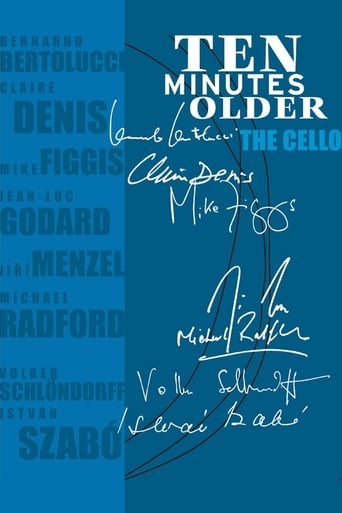spacedrone808
1) Bernardo Bertolucci (segment "Histoire d'eaux") Idea is good and clear, but artistically absolutely flat and poor. 2) Mike Figgis (segment "About Time 2") So-called modern art with deep intellectual connections? No, just schizophrenic multi-cam raving mess. I am indisposed to solve "hidden" mystery of this video clip.3) Jiri Menzel (segment "One Moment") Memoirs of old womanizer. More close to ART, than previous episodes.4) Istvan Szabo (segment "Ten Minutes After") Charms of family life or how to murder your husband in 10 minutes. No emotions.5) Claire Denis (segment "Vers Nancy") Highly intellectual talks about migration problem, and about people with different mentality and world disposition. No comments.6) Volker Schlondorff (segment "The Enlightenment") Mixed feelings. Standing aside from other episodes. And this is GOOD! Conclusion: Don't plan your life, make it flow.7) Michael Radford (segment "Addicted to the Stars") Curious.8) Jean-Luc Godard (segment "Dans le noir du temps") Interpreted as random thoughts. Different moods with no change in music theme though.Stupid.
Fimma
I saw this movie twice and going to look once again Bertolucci's and Michael Radford's segments.So, my experience talks: it's not right choice for looking at 11 p.m. after hard work day. For looking non-commercial cinema you must have just a little open mind.It's a real pleasure, that all contributions so different, from simple mixed own old works, as Jean-Luc Godard has done to Bertolucci's talented and deep adaptation a mythological story of water to modern life. You know, that all of them started from one place - 10 minutes limit and theme - about time. After all, you see eight author's ways and points of view.One of them I find too bore ("Vers Nancy"). Two another - unexpected not interesting ("Ten Minutes After", "Dans le noir du temps"). That's worst what I can say about.Even against my opinion that director must not work as DJ, but create something new, Jiri Menzel's elegant, warm and simple contribution hold on. Exactly such effect after cool emotionless sci-fi "Addicted to the Stars". New James Bond looks convincingly in every role of someone, who is completely devoted one idea.
Framescourer
'With complete creative freedom, fifteen directors bring their interpretation of time to the screen', says the British National Film Theatre screening note. Alas, most of the film(s) take this carte blanche at it's worst implication and indulge themselves at the exclusion of the audience.Good things to come out of the showing though... Mike Figgis' splitting a linear story into a 4-way split screen of different perspectives. What's the real narration? Are the dull gaps in each linear tale as important as the action in another? This also finds expression in Schlondorff's The Enlightenment and Denis' Vers Nancy where coherent but quickly unengaging voiceovers give way to the visual dialectic. Which is the essay on time - one, the other, or a linear combination of the two? The most accessible is Micheal Radford's largely straightforward tale of time travel.A bit of a grouch - there's an element of 'oh, it's just a short so we won't bother with detail because it's the concept that matters'. Well (for example) Szabo and Bertolucci's efforts seem a little plastic as a result of off the peg costuming. Plus there's an element of the director's wanting to tackle a different issue, that of immigration - although the context of the intruder is a companion of the linear nature of time. And the idea of unifying the shorts beyond the title with meditative 'cello music is a bad one, blunting the idiosyncratic nature of each.The film ends with a nod to three other directors. I was pleased to see the name of Chris Marker there: his 27 min narrated stills feature La Jetee is a much more approachable and thorough investigation into the nature of time (and memory). I don't recommend this as a film for anyone beyond film students and perhaps philosophers.
Zadam
Would be excellent for background visuals during a house part-e. It's like a 90 minute screen saver for the artistic types. Plug-in! While I am sure there are varying plots throughout, or not, I found myself enjoying having it on as a late night fadeout. I found some part grabbing my attention and other parts cracking a grin. I would suggest taping it for the house part-e visuals or your own late night fadeout. It's definitely easy on the brain.


 AD
AD



